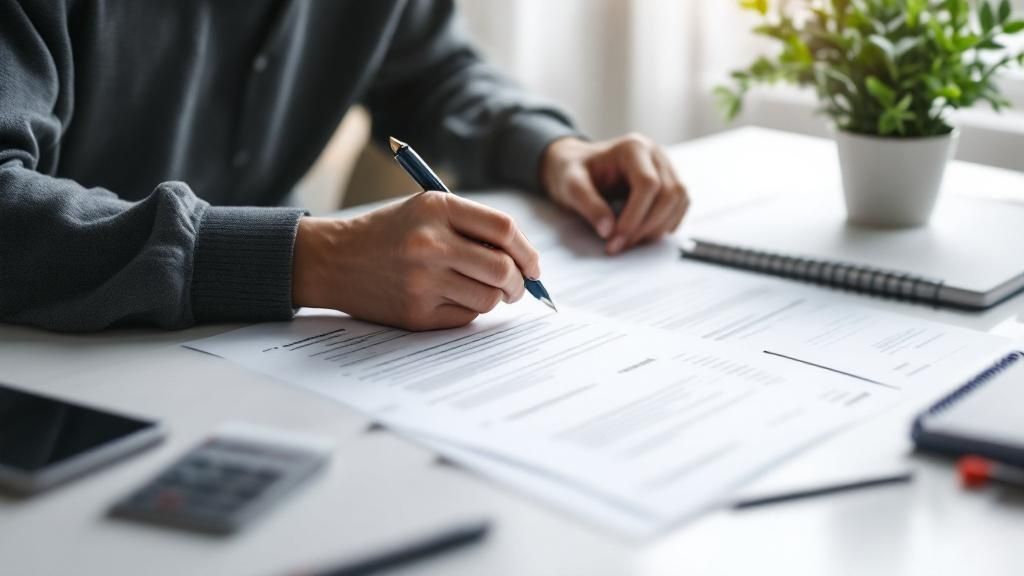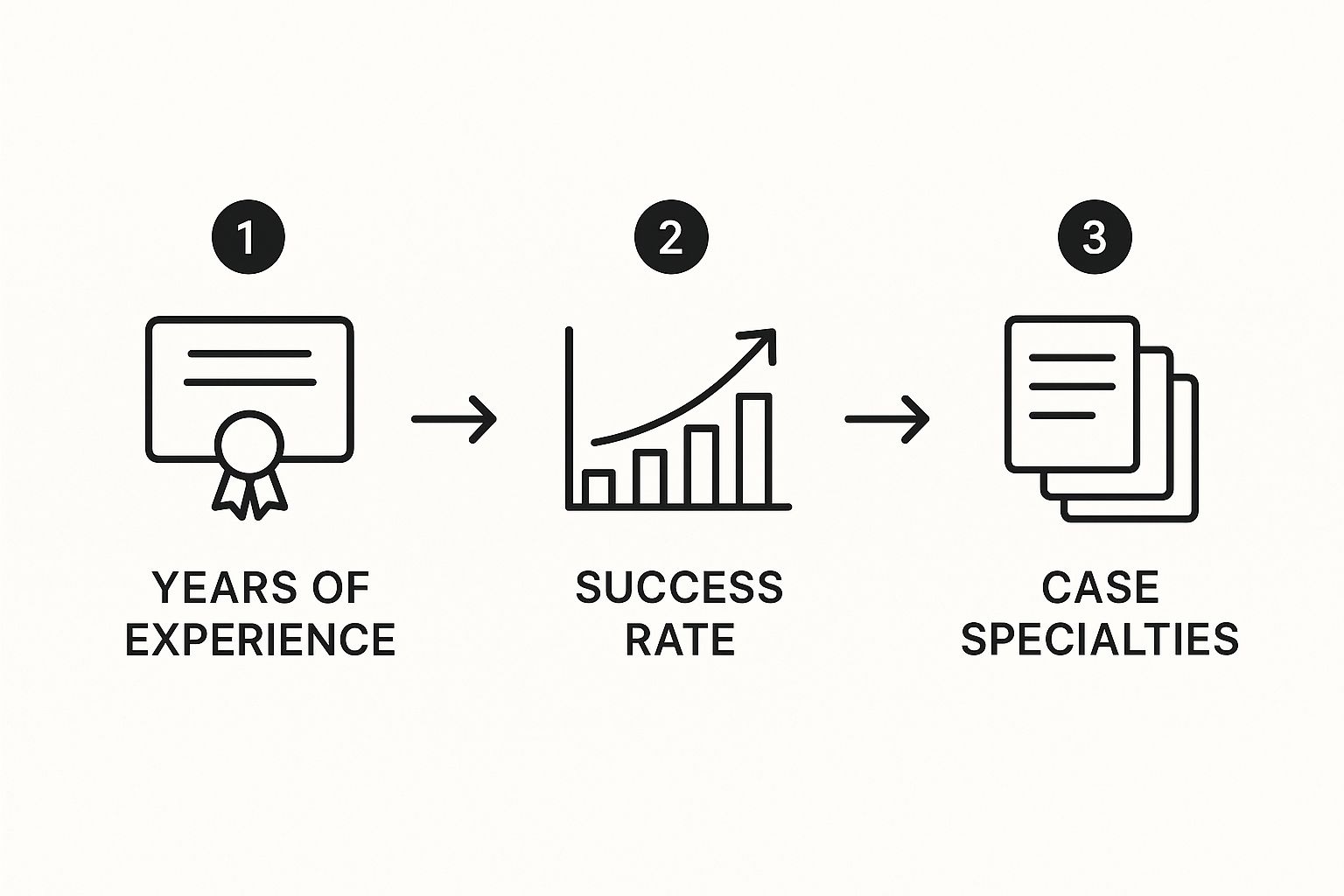How to Choose a Personal Injury Lawyer
"I was satisfied once John Bell took over my case."
"Communication was always timely."
How to Choose a Personal Injury Lawyer
When you're trying to choose a personal injury lawyer, you're looking for more than just a name on a shingle. You need a specialist who lives and breathes this area of law, someone with a proven history of success. They should be completely upfront about their contingency fee agreement and have a communication style that actually keeps you in the loop.
The reality is, most claims never see the inside of a courtroom. That means the right attorney isn't just a fighter; they're a sharp, experienced negotiator.
What to Do After Your Injury

The time after an injury is often a blur of chaos and stress. You're juggling doctor's appointments, fielding calls from insurance adjusters, and just trying to get through the day. In the middle of all that, you have to make one of the most important decisions for your future: picking the right legal partner. Who you choose will absolutely shape the outcome of your claim.
Think of this guide as your starting point for how to find the right personal injury lawyer here in Oregon.
As you start your search, it helps to zero in on a few core areas. Don't just pick the first name you see on a billboard. You need to dig a little deeper.
To help with this, I've put together a quick table that summarizes the key things to look for.
Key Lawyer Evaluation Criteria at a Glance
| Specialized Experience | Focuses specifically on personal injury; has handled cases similar to yours (e.g., car accidents, slip-and-falls). | A general practice lawyer won't know the specific tactics and laws. You need a specialist. |
| Transparent Fees | A clear contingency fee percentage (33%-40% is standard); explains how case costs are handled. | You should never have to guess what you'll owe. Hidden fees or confusing terms are a red flag. |
| Clear Communication | Listens to your story; answers questions directly; explains the process in plain English. | This is a partnership. You need to feel comfortable and confident in your attorney's ability to keep you informed. |
This table isn't exhaustive, of course, but it gives you a solid framework for those initial conversations. Every one of these points is crucial for finding an advocate who will truly fight for you.
It's Not All About the Courtroom
A lot of people think a good lawyer is just someone who's great in a trial. But here’s a statistic that might surprise you: of the hundreds of thousands of personal injury cases filed in the U.S. each year, only about 5% ever go to trial.
What does that mean for you? It means the vast majority of claims are settled out of court. This makes your lawyer's negotiation skill absolutely critical.
A savvy negotiator can often get you a fair settlement much faster, and with a lot less stress, than a drawn-out court battle. This is a skill you should be probing for in your first meeting.
Finding someone who shines at the negotiation table is every bit as important as their trial record. The legal road ahead can be long and complicated. Taking some time to understand the big picture can make you feel more in control, so it's a good idea to read up on navigating the personal injury claims process from beginning to end. This will give you the confidence you need as you start evaluating your options.
Digging Into a Lawyer's Real-World Experience

When you’re looking for the right personal injury lawyer, it’s easy to get sidetracked by a slick website or a long list of services. But here’s the thing: real expertise is specific and proven, not just advertised. Your goal is to cut through the marketing fluff and get a clear picture of an attorney's actual track record.
The best place to start is during your initial consultation. This is your chance to ask direct, pointed questions. Don't hold back—this is your case and your future we're talking about.
Questions That Uncover True Expertise
Forget asking generic questions like, "Have you handled cases like mine?" You need to get much more specific to understand if they have the right kind of experience. The answers you get will reveal everything.
Try asking questions like these instead:
- "How many cases involving a commercial truck on I-5 have you personally handled from intake to resolution?"
- "Can you walk me through the outcomes of a few slip-and-fall cases you've settled in the past year?"
- "What percentage of your firm's total caseload is dedicated exclusively to personal injury claims?"
These questions demand a real answer, not just a simple "yes." An attorney who mostly handles wills and estates but takes on the occasional injury case will stumble here. A true specialist will have this information right at their fingertips.
Think about it this way: the legal strategy for a complex trucking accident involving federal regulations is a world away from a standard rear-end fender bender. You need someone whose experience directly matches the details of your situation, not just the broad category of "car accidents."
How to Verify Their Track Record
Beyond asking good questions, you need to look for hard evidence. This is where you can confirm if their claims of experience are legitimate. According to a recent report on hiring personal injury lawyers, a proven track record is the top priority for nearly 40% of clients. On top of that, 27% want to see tangible proof of success, like high-dollar verdicts and settlements.
Look for specific case results and client testimonials on their website. Do they feel real? A vague claim like, "We won a multi-million dollar settlement," is just marketing copy.
What you want to see is something more concrete, like a "$1.2 million settlement for a construction worker injured by faulty scaffolding." That level of detail signals a genuine result. The same goes for testimonials—authentic reviews often mention the lawyer by name and describe the process in personal terms. This is how you find an attorney who doesn’t just talk a good game but has a history of delivering for their clients.
Decoding Legal Fees and Financial Terms
Let's talk about money. It can be an awkward conversation, but it's one of the most important ones you'll have before hiring a personal injury lawyer.
Most reputable firms in Oregon, ours included, work on a contingency fee basis. You've probably heard the phrase, "you don't pay unless we win." That’s the core of it—the attorney’s fee is contingent on securing a financial recovery for you.
But the devil is always in the details. A standard contingency fee usually falls between 33% and 40% of the settlement or jury award. The real question you need to ask, though, is how case costs are handled.
These are the out-of-pocket expenses necessary to build and argue your case, and they can be significant. We're talking about things like:
- Court filing fees
- Fees for pulling all your medical records
- Hiring expert witnesses (e.g., accident reconstructionists or medical specialists)
- The cost of depositions and official transcripts
Gross vs. Net: Why This Distinction Matters
Here’s the single most important question you can ask about fees: Is the attorney’s percentage calculated from the gross settlement (the total amount) or the net settlement (the amount left after costs are paid)?
This small detail can drastically change how much money ends up in your pocket. Always insist on seeing a written example of how their calculation works.
A quick example makes this clear. Imagine a $100,000 settlement with $10,000 in case costs. If the fee is taken from the gross amount, the lawyer’s cut comes off the top, and you pay the costs out of what's left. If it’s from the net, the costs are paid first, and the lawyer's fee is calculated on the remainder—a method that is almost always better for the client.
As you can see, an attorney's track record and experience often justify their fee structure. It's all connected.

When you understand the financial agreement from day one, you can move forward with confidence. Knowing how fees work is a critical piece of the puzzle, but to see the full picture, it helps to learn about the complete car accident settlement process and what to expect from start to finish.
Finding a Lawyer Who Actually Communicates

When you're recovering from an injury, the last thing you want is a lawyer who goes silent. You're already juggling medical bills and stress; feeling like you've been left in the dark about your own case just makes everything worse.
This relationship has to be a partnership, and clear, consistent communication is the bedrock of that partnership. It's about more than just getting a monthly email update. A great legal partner will take the time to break down confusing legal jargon into plain English you can actually understand. They should make you feel heard from that very first phone call.
Evaluating Communication from Day One
Your initial consultation is a golden opportunity to see exactly how a lawyer and their firm operate. Pay close attention to how they interact with you right from the start. Are they truly listening to your story, or do you feel like they're just rushing to get to the next appointment?
Here are a few communication "green flags" to watch for:
- Quick to Respond: Did they get back to your initial call or email in a reasonable amount of time? A long delay before you've even hired them is a bad sign.
- Clear, Simple Explanations: When you ask a question, do they give you a straight answer, or do they bury it in legalistic phrases?
- A Clear Point of Contact: You should leave that first meeting knowing exactly who to call with questions—whether it’s the lead attorney, a dedicated paralegal, or a case manager.
On the flip side, if you get bounced around between junior staff members without any real introduction, consider it a red flag. It can often point to a disorganized firm where it’s easy for a case like yours to fall through the cracks.
Your peace of mind is invaluable during a personal injury claim. Choosing a lawyer who prioritizes keeping you informed can drastically reduce your stress and help you feel in control of the process.
Modern Tools and Client-First Systems
A law firm's tech says a lot about how much they value your experience. Do they offer something like a secure online client portal where you can log in and see case updates 24/7? It seems like a small thing, but it gives you instant access to information without having to play phone tag all day.
Firms that invest in technology for client communication are often the ones that are more efficient and truly focused on their clients. In fact, research shows that firms using client-friendly tools like online schedulers and portals see higher revenue and bring in more clients. This tells you that people value easy access and solid communication when choosing a lawyer.
You can read more about these legal industry trends to see just how much of a difference this stuff makes.
Putting It All Together: Making the Final Call
You’ve done the hard work. You've sat down with a few different lawyers, asked tough questions, and gotten a feel for how they operate. Now it’s time to pull all that information together and make a choice.
This final step is a blend of logic and gut feeling. You have the facts—their experience, their fee structures, their track record. But you also have your own intuition about who you can truly partner with.
Trust Your Gut, But Check the Facts
Who did you click with? Who actually listened to your story without interrupting or making you feel like just another case file? That personal connection is more important than you might think.
A simple pro-con list can be surprisingly effective here. Grab a piece of paper and jot down the good and the not-so-good for your top two choices.
- Pros: Maybe one lawyer had direct experience with a case almost identical to yours. Perhaps another had a paralegal who was incredibly organized and reassuring.
- Cons: Did one office feel chaotic? Did a lawyer give you vague answers or seem distracted during your meeting? Write it all down.
Seeing it all laid out in black and white often makes the right path forward surprisingly clear. Remember, you’ll be sharing personal, often difficult, details of your life with this person. You have to trust them.
A great attorney isn't just a legal machine with a fancy degree. They need to be a guide you can rely on during one of the most stressful periods of your life. Feeling confident in your choice is everything.
Once you’ve settled on the right attorney, there's one last checkpoint: the retainer agreement. This is the official contract. Read it carefully. Make sure you understand exactly how their contingency fee works and who pays for case costs (like expert witnesses or filing fees) and when.
Don't be shy about asking questions before you sign. Getting clarity on every single detail now ensures you and your new legal team are starting off on the same page.
Answering Your Lingering Questions Before You Hire
Even after you've done your research and narrowed down your choices, a few final questions always seem to pop up. It’s completely normal. Getting straight answers to these last-minute concerns is key to feeling confident about your decision to hire a particular attorney.
Let's start with the one on everyone's mind: "How much is this going to cost me?"
Thankfully, the vast majority of personal injury lawyers in Oregon operate on a contingency fee basis. In plain English, this means you pay nothing out of your own pocket upfront. The attorney's fee is simply a pre-agreed percentage of the money they recover for you, which is usually somewhere between 33% and 40%. If they don’t win your case, you owe them nothing for their time.
Making Your First Meeting Count
To get the most out of that initial consultation, a little prep work goes a long way. Try to gather all the documents you can find that are related to your accident and injuries.
Think of it as building your case file from day one. Bring things like:
- The official police or accident report
- Any medical records, bills, or doctor's notes you have
- Photos or videos of the accident scene, your vehicle, and your injuries
- All correspondence you've received from any insurance companies
I also recommend jotting down a quick summary of what happened, in your own words. It helps keep the details fresh and ensures you don't forget anything important when you're talking with the lawyer.
What if You Need to Switch Lawyers?
This is a tricky one, but it happens. The short answer is yes, you absolutely have the right to change your attorney at any point during your case.
However, it's not always a simple switch. Your first lawyer will likely place a lien on your future settlement to get paid for the work they've already put in. Before you jump ship, I always advise trying to talk through any problems with your current lawyer first. It can save you a lot of headaches down the road.
For a deeper dive into these topics and more, this list of personal injury FAQs is a great resource that covers a lot of ground.
A settlement can take months or even years, but your bills won't wait. The financial pressure during this time is a real and significant stressor for many families. For some, looking into options like personal loans for bad credit can be a necessary step to stay afloat while their case progresses. It's important to know what's out there to help you manage.
At Bell Law, we know you have questions, and we believe you deserve clear, honest answers from the very beginning. If you're wondering what to do next after an injury in Oregon, let's talk. Contact us for a free consultation with no strings attached. Learn more at https://www.belllawoffices.com.
Disclaimer: The information on this page is provided for general informational purposes only and is not legal advice. Reading this content does not create an attorney-client relationship. For advice about your specific situation, please contact a licensed attorney.







